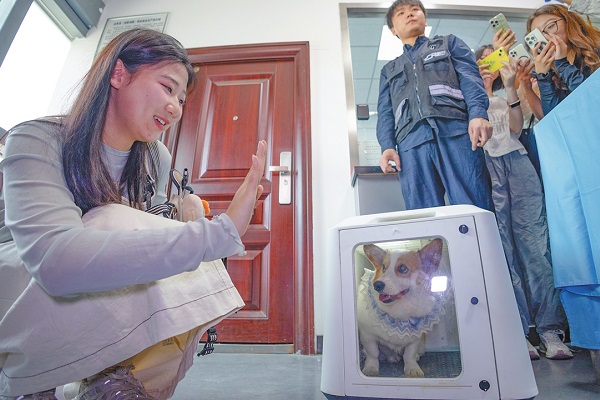Public services increasingly pet-friendly amid young Chinese demand

A passenger checks in her pet for transport on a high-speed train at Hangzhou East Railway Station in East China's Zhejiang Province on April 10. Photo: VCG
The first high-speed train with the pet shipping services in China, G119, departed from Beijing South Railway Station on Thursday. With this, pets and their owners can now depart on the same train and arrive at the destination together.
China's railway authorities launched trial operations of pet shipping service on select Beijing-Shanghai high-speed train routes starting from Tuesday. The announcement immediately trended on China's social media platform Sina Weibo as many young pet owners welcomed the service.
Coco, a 2-year-old Poodle, based in Beijing, is a frequent traveler. He has taken the flight both in the cabin and traveled with the cargo. He has also experienced the shipping service of the slow-moving green trains. His owner told the Global Times on Thursday that their family is very excited about the new shipping service provided by the high-speed trains, noting "It definitely offers us more choices when traveling with Coco."
The service, allowing passengers to book space for one healthy, small-sized cat or dog, follows a "separate but supervised" model. Pets travel in specially designed, climate-controlled containers placed in a separate cargo area, with staff monitoring their condition throughout the journey. While owners and pets ride the same train, they are not allowed to interact mid-trip.
The move, a first for China's high-speed rail system, marks a major step toward accommodating the growing demand for pet-inclusive travel, Zhang Yi, CEO of the iiMedia Research Institute, told the Global Times.
"The high-speed rail pet shipping service is a proactive innovation by the authorities in response to the growing pet market, which deserves recognition. Some airlines are making similar efforts as well. I think these are all natural responses to the current trend," Zhang said.
Emotional anchors
More and more young people in China are no longer content with leaving their pets at home. For them, raising a pet is about more than just giving it food and shelter. It's about emotional wellbeing and shared experiences. Whether it's sipping coffee together at a cafe, browsing pet-friendly malls, or joining outdoor sports events, pets are becoming part of their owners' everyday social lives, and sometimes, part of their travels, too.
On a recent breezy weekend in Shenzhen, South China's Guangdong Province, dogs and their owners paired up, forming about 300 teams. Together, they completed a series of challenges, such as mud pits, water traps, tunnels and slopes. These furry friends dashed through obstacle courses, posed for photos, and wandered through a pet-themed fair with their owners, shopping for post-workout treats.
"I was worried at first that Mocha might not be comfortable around so many dogs," a participant surnamed Yu told the Global Times. "But once we arrived, I saw how happy she was playing. I also met so many like-minded pet lovers. It was truly a wonderful experience."
The number of pet dogs and cats in the country's urban areas reached 124 million. The urban pet (dogs and cats) consumer market reached 300.2 billion yuan (about $40.9 billion), according to the 2025 China Pet Industry White Paper jointly published by several pet and vet associations. And young people have now become the main force driving pet ownership in China, with those born in the 1990s accounting for 41.2 percent and those born after 2000 making up 25.6 percent.
Today, pet ownership is increasingly about emotional support. Many pets are now considered family members and serve as important emotional anchors. Studies have shown that interacting with pets can boost oxytocin and dopamine levels while reducing cortisol, helping to relieve stress. This growing attention to pets' happiness reflects the recognition of the emotional value they bring to their owners, Ma Jianwen, a registered counselor of the China Association for Mental Health, told the Global Times.
"Additionally, pets have become social bridges. For examples, young people often bring them to cafes, themed gatherings, or casual meetups, using pet-related activities as a way to build and maintain human connections. And the society is making changes to adapt to such needs," said Ma.
Everyday companion
At a boutique coffee shop located in Nanluoguxiang, one of Beijing's most famous and popular hutongs, a couple of young customers were chatting over coffee. A well-pampered Maltese sitting beautifully inside her trolley besides the table, occasionally drew other customers to come patting or taking photos.
"I think most cafes like us have always been pet-friendly. Pets are not just small animals. They are increasingly seen as family members by many people. That's why we are happy to welcome them with a more open and inclusive mindset," owner of the coffee shop, 26-year-old Yang Yue, told the Global Times.
Many young people enjoy bringing their pets into the cafe, and most customers seem to be quite welcoming of pets. The young pet owners are generally very considerate when taking their pets out. They often bring pet carriers, mats, and other supplies. Even if there's any customer who is afraid of dogs, the owner will keep the pet inside the carrier. If a pet misbehaves, the owners usually step in quickly to manage the situation, said Yang.
Besides cafes, shopping malls, some tourist spots have made pet-friendly as their branding.
Forget about pet-friendly themed hotels and guesthouses, it's no big deal for Maoshan Forest World in Changzhou, East China's Jiangsu Province. Your four-legged companion will be welcomed with a gift pack when you purchase pet admission tickets: a pet toy, pet wipes, pet waste bags, a pet compressed towel, and a pee pad.
"Pets have become emotional companions within families, driving a shift in tourism from simple sightseeing to experience-based companionship. Over the years, we have partnered with local pet associations to organize many pet-friendly activities. At the end of March this year, the scenic area launched a themed event called 'Spring Outing Season for Pets,' inviting pet owners to bring their furry companions for a joyful spring adventure," the park told the Global Times.
Meanwhile, Zhang noted that while China's pet industry is expanding fast, it started relatively late. There's still a lot of room for further growth and development. "But because of this, it also presents a major opportunity, one that matches the needs of a large and growing consumer group and an industry full of potential," Zhang said.
-
Inside Hangzhou: China's high-tech dream factory
March 12, 2025



